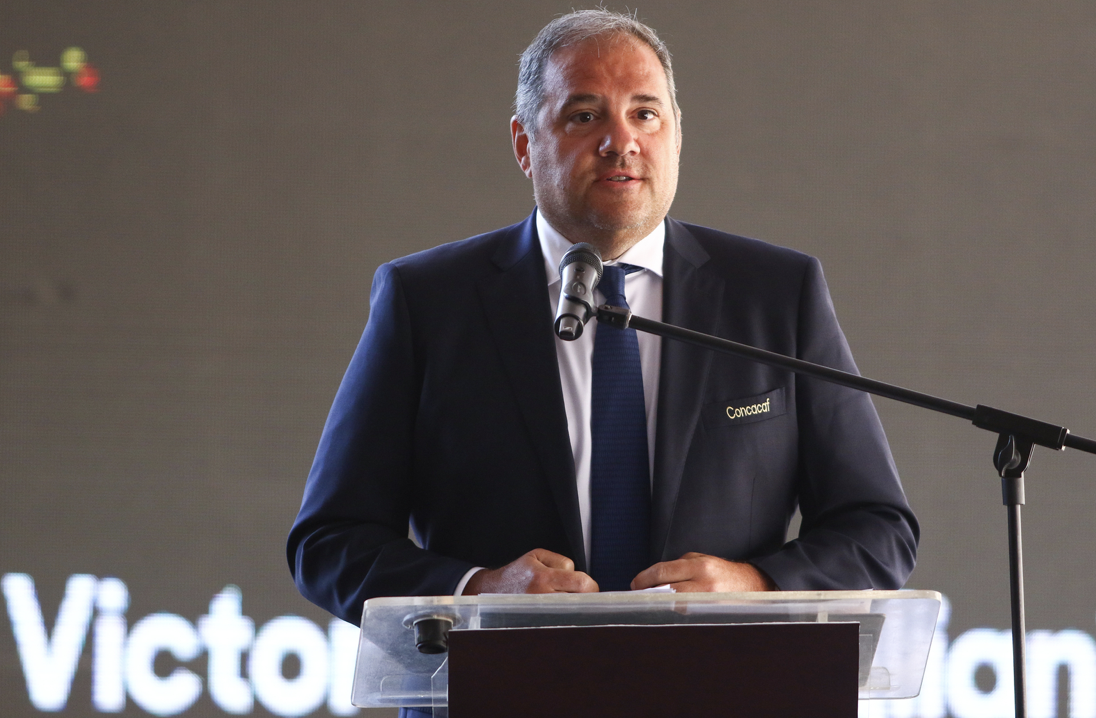February 26 – Concacaf’s membership has unanimously re-elected Victor Montagliani as president of the Confederation at its Congress in in Guatemala. The four-year term will run from 2023 to 2027.
Montagliani (pictured) was first elected president in May 2016 to fulfill the rest of the term vacated by Jeff Webb following his arrest following the May 2015 FBI raids on FIFA. He was re-elected unopposed in 2019 and was unopposed again this time round.
Thanking his members for their support, Montagliani said: “We have united as One Concacaf and prioritized a football first agenda in our Confederation. Football first is about ensuring we put the game at the heart of all decisions we make. Ultimately, football is not about who has the most revenue, trophies, or medals, but it is about people and our connection to each other through the beautiful game.
“I have said many times before that leadership is about service, not power. And my commitment to continue serving and supporting all of our Member Associations is unbreakable. In Concacaf our unique characteristics are our grit, our passion, and our perseverance to achieve our long-term goals. These characteristics, combined with our unity, are the “secret sauce” of Concacaf and I truly believe that world football could do with more of Concacaf,” he continued.
Montagliani took over at a difficult time for Concacaf with the US Department of Justice have dropped its world changing bombshell on FIFA and global football.
As president of Canadian Soccer he had already undergone a governance reform of his own federation and in 2016 he was appointed as Concacaf’s representative on FIFA’s Reform Committee. Delivering governance reform to Concacaf was not straightforward – particularly with the dominant and generally non-trusting voting block of the Caribbean – but was achieved.
Since then Montagliani has been true to his promise on focussing on delivering competition and development opportunity for his member nations. This has seen the introduction of the Nations League, the expansion of the Gold Cup to include a centralised 12 team preliminary round. Next season will see an expansion of the Champions League, while this season will see the newly formatted Leagues Cup (played for the first time between all teams in the LigaMX and MLS) recgonised with Champions League qualification.
In the women’s game the Concacaf W strategy has seen almost immediate results with the 8-team Concacaf W Championship in Monterrey, Mexico, having now see six teams qualify for the Women’s World Cup in Australia/New Zealand this summer. It is worth noting on terms of overall regional development, that traditional powerhouse Mexico was not one of them.
“In delivering our ongoing mission to develop football in our wonderful region, we will continue to be authentic in our dialogue, in our interactions, and in our football. This is a global game that connects us all and belongs to us all,” said Montagliani.
Elections
Montagliani was not the only official elected or re-elected unopposed. Seven different member associations were represented on the Concacaf Council while Closta Rica’s Rodolfo Villalobos swapped a position on the Concacaf Council for a sport on the FIFA Council.
- Concacaf Council Member (Female): Sonia Fulford, Turks and Caicos Islands
- Concacaf Council Vice President (Caribbean): Randolph Harris, Barbados
- Concacaf Council Vice President (North America): Nick Bontis, Canada
- Concacaf Council Vice President (Central America): Jorge Salomon, Honduras
- Concacaf Council Member (North America)*: Cindy Parlow Cone, USA
- Concacaf Council Member (Central America)*: Sergio Chuc, Belize
- FIFA Council Member (Central America): Rodolfo Villalobos, Costa Rica
Infrastructure build
Concacaf also announced that, following its RFP process, the confederation will build a state-of-the-art sporting complex in the Dominican Republic.
“This facility will host centralized Concacaf competitions and football initiatives and will benefit all Concacaf Associations,” said Concacaf. “The new sporting complex will eliminate many of the travel and logistical challenges faced by Concacaf federations and provide a high-quality facility that will benefit the entire Concacaf football family.”
More details of the complex have yet to be released.
Contact the writer of this story at moc.l1751590636labto1751590636ofdlr1751590636owedi1751590636sni@n1751590636osloh1751590636cin.l1751590636uap1751590636

